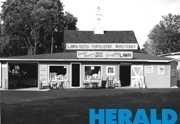Baldwin loses landmark87-year-old Eckhardt Feed and Coal closes its doors
Posted
Visitors to Eckhardt's were transported back to another era. Chickens roamed the grounds, and piles of pumpkins were an October tradition. Eckhardt said he decided to sell because "retirement beckons."
"My father died behind the desk, and I didn't want that to happen to me," he said. He wants to spend more time with his wife, Elizabeth, and their 12 grandchildren. Modern-day pressures also played a part in his decision, Eckhardt said.
"Home Depot, Lowe's, taxes and insurance" were contributing factors, he said. The buying power of a huge retailer like Home Depot, for example, puts small businesses like his at a great disadvantage.
"We're losing a historical landmark," said Marjorie Jones, a resident of Baldwin Harbor for 52 years. Over the years, her family bought coal, seeds, bulbs and pumpkins from Eckhardt's. "They didn't have a cash register," she recalled. "Bob's father, Ted, would keep a shammy purse in his overalls."
The "family feeling" of Eckhardt's, and its reminder of a rural past, is irreplaceable, said Danny Forbes Breen, who has worked at Eckhardt's since 1988. "We know the parents who shop here, and their children, and where they went on vacation," said Breen. "People loved to come here and look at the chickens. Eckhardt's has preserved the past. This has been more than a job for me. It's been a state of mind."
Throughout the store's history, its employees, many of whom worked at Eckhardt's for decades, played an important role in forging the close ties the store had with its customers. A particular customer favorite was Eddie Johnson, who worked at Eckhardt's from 1955 to 1999. Mentally, Johnson might have been a "little slow," Breen said, but he was "dumb like a fox."
To the end, the store sold coal for furnaces and feed for chickens, rabbits and other animals.
"Small businesses built this country," Breen said. "When times are hard, people have to shop at these big stores because of the low prices. But it's tough on the small businesses."
The store got its start when Frederick J. Eckhardt moved to Baldwin in 1914 with his wife, Margaret Mary, and their three sons, leaving a thriving real estate business in Manhattan. Land speculation on Long Island proved to be a dicey proposition, so the Eckhardts decided to open a feed and grain store in 1917 so their sons, Charles, Fred W. (known as Ted) and Adolph, could run a solid and substantial business. The family decided to name the business M.M. Eckhardt (for Margaret Mary), but used initials because women didn't run businesses in those days.
Staying solvent during the Great Depression was a major challenge, as hay, feed and coal prices plunged. To beat the high cost of freight on the Long Island Rail Road, the brothers invested in a GMC tractor trailer and took turns driving the truck on long, overnight journeys to their suppliers. This strategy proved successful, as the Eckhardts were able to undersell the competition.
The family later became prominent in the town through another avenue - banking. In 1936, Ted was elected a director of the Baldwin Federal Savings and Loan Association, and in 1951 he assumed its presidency. The bank grew substantially, and became the Baldwin-Bellmore Federal Savings and Loan Association, which occupied a large colonial building on South Grand Avenue, with Ted serving as chairman. North Fork Savings Bank presently occupies the building.
Several Baldwin residents have expressed disappointment to Ted that Eckhardt's is now a thing of the past. "But I haven't seen those people at the store in five years," he said.
Comments about this story? Baldwin- editor@li.com or 569-4000 ext. 207.
Report an inappropriate comment
Comments

 44.0°,
Mostly Cloudy
44.0°,
Mostly Cloudy 




